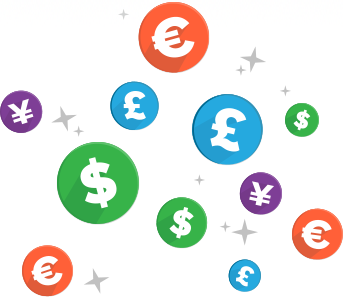The Hong Kong currency is the 13th most traded currency in the world. Being Hong Kong’s official currency, the Hong Kong Dollar is also used in neighboring Macau. The Hong Kong currency is in the
subdivision of 100 cent or 10 hou. The Hong Kong currency is pegged to the US Dollar at a rate of about 7.80 HKD to 1 USD. The governmental currency board – the Hong Kong Monetary Authority has
distributed the currency issuance licenses to three commercial banks - Standard Chartered, Bank of China and HSBC. This in total divides the banknote circulation arrangement among four different
note issuers. A bank can issue a Hong Kong Dollar only if it has the equivalent exchange in US dollars on deposit.
Some facts that you ought to know about the hong kong dollar:
1. The short name for Hong Kong currency is HKD.
2. The symbol for HKD is $, HK$.
3. The most recurrently used coins are 1 HOU, 2 HOU, 5 HOU, HK$1, HK$2, HK$5, HK$10.
4. The most frequently used banknotes are K$10, HK$20, HK$50, HK$100, HK$150, HK$500, HK$1000.
History of Hong Kong Dollar
The Hong Kong dollar (HKD) is the official currency of Hong Kong, a Special Administrative Region of the People's Republic of China. Its history dates back to the 19th century when Hong Kong was a British colony.
In 1841, the British Empire took control of Hong Kong Island as a result of the First Opium War with China. The following year, Hong Kong was declared a free port, and trade rapidly grew. However, no formal currency was in use, and the Chinese silver dollar was commonly used in daily transactions.
In 1863, the Hong Kong Mint was established and began producing Hong Kong silver dollars, which were pegged to the Mexican peso. However, the coins were not widely used, and the Chinese silver dollar remained the dominant currency in Hong Kong.
In 1935, the Hong Kong government established the Hong Kong Currency Board to issue banknotes. The board was responsible for maintaining the stability of the Hong Kong dollar by pegging it to the British pound sterling , with an initial exchange rate of HK$16 to £1.
During World War II, the Japanese occupied Hong Kong from 1941 to 1945, and issued their own currency, the Japanese military yen, which was used alongside the Hong Kong dollar. After the war, the Hong Kong Currency Board resumed control of the Hong Kong dollar and maintained the peg to the pound sterling.
In the 1970s, the value of the pound sterling began to decline, and the Hong Kong government decided to switch the peg to the US dollar in 1972. The exchange rate was set at HK$5.65 to US$1 and has remained relatively stable since then.
In 1983, the Sino-British Joint Declaration was signed, which outlined the transfer of sovereignty of Hong Kong from the United Kingdom to China in 1997. As part of the agreement, the Hong Kong dollar would continue to be used as the official currency of Hong Kong, and its peg to the US dollar would be maintained.
Following the transfer of sovereignty in 1997, the Hong Kong Monetary Authority (HKMA) took over the responsibility of issuing banknotes and maintaining the stability of the Hong Kong dollar. In 2005, the HKMA introduced a trading band of HK$7.75 to HK$7.85 against the US dollar, allowing for more flexibility in the exchange rate.
Today, the Hong Kong dollar is widely used in Hong Kong for daily transactions and is also accepted in some neighbouring areas such as Macau and some parts of southern China. Its stability and reliability as a currency have made it a popular choice for international trade and investment.
Factors Affecting Hong Kong Dollar
Like any other currency, the value of the Hong Kong dollar is affected by various factors. Here are some of the key factors that can affect the Hong Kong dollar:
1. Interest rates:
One of the key factors that affect the value of the Hong Kong dollar is interest rates. Higher interest rates typically lead to a stronger currency, as investors are attracted by the higher returns on their investments. Conversely, lower interest rates can lead to a weaker currency, as investors seek higher returns elsewhere.
2. Political and economic stability:
The political and economic stability of Hong Kong is also an important factor that affects the value of the Hong Kong dollar. Political instability or uncertainty can cause investors to lose confidence in the economy, leading to a weaker currency. Similarly, economic instability such as a recession or high unemployment can lead to a weaker currency.
3. Trade balance:
If Hong Kong exports more goods and services than it imports, this can lead to a surplus of Hong Kong dollars in the global market, which can lead to a stronger currency. Conversely, if Hong Kong imports more than it exports, this can lead to a deficit of Hong Kong dollars, which can weaken the currency.
4. Monetary policy:
The monetary policy of the Hong Kong Monetary Authority (HKMA) can also affect the value of the Hong Kong dollar. The HKMA can adjust interest rates and the supply of Hong Kong dollars in order to influence the value of the currency. For example, if the HKMA wants to weaken the Hong Kong dollar, it can sell Hong Kong dollars in the foreign exchange market, which increases the supply of Hong Kong dollars and reduces its value.
5. Global economic conditions:
Finally, the strength of the US dollar, as well as economic conditions in major trading partners such as China, can affect the demand for Hong Kong dollars and hence its value.


















